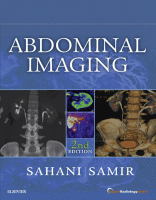Physical Address
304 North Cardinal St.
Dorchester Center, MA 02124

Etiology Gastric outlet obstruction is an uncommon clinical consequence with a wide range of causes. Benign and malignant as well as gastric and extragastric causes have been described. It was once relatively common to see patients present with gastric outlet…

Stromal tumors of the stomach are rare tumors that arise from the mesenchyma, the connective tissue and blood vessels that support an organ. The parenchyma, on the other hand, represents the functional tissue of the organ. Within the stomach, the…

Malignant Mucosal Processes Etiology A wide range of benign disease processes can affect the mucosa of the stomach, including inflammatory, infectious, hereditary, and autoimmune processes. What these processes have in common is that they affect one of the primary defenses…

Technical Aspects Technique The patient is given sodium bicarbonate/dimethicone granules (Carbex), a gas-producing agent, to swallow and then drinks the E-Z HD 250% weight/volume 60 mL barium. Spot views of the esophagus are taken at the beginning (anteroposterior and right anterior…

Technical Aspects Anatomy The esophagus extends from the pharynx to the cardiac portion of the stomach. The length of the esophagus is approximately 25 to 30 cm, and it has cervical, thoracic, and abdominal portions. The cervical portion extends from the…

Etiology The causes of upper gastrointestinal bleeding include esophageal or gastric varices, Mallory-Weiss tears, gastritis, and gastric or duodenal ulcers. Common causes of lower gastrointestinal tract bleeding include colonic diverticulosis, ischemic and infectious colitis, colonic neoplasm, benign anorectal disease, arteriovenous…

Etiology The presence of extraluminal air in an acutely ill patient with abdominal pain is an ominous sign that usually indicates perforation of a hollow viscus. Common causes include gastroduodenal peptic ulcer disease, perforation of a gastrointestinal neoplasm, acute appendicitis…

Etiology Acute appendicitis results from obstruction of the appendiceal lumen from any cause (most commonly a fecalith), leading to overdistention and superinfection and, if not treated promptly, to perforation and peritonitis. Epidemiology Acute appendicitis is a common clinical concern in…

Etiology Renal calculi are typically caused by crystallization of supersaturated stone-forming materials in the urine. Calcium, in the form of calcium oxalate, calcium phosphate, and calcium urate, is the most common stone-forming material. Uric acid is the second most common…

The focus of this chapter is on positron emission tomography (PET) and PET and computed tomography (PET/CT) applications specific to the tumors arising in the gastrointestinal tract and female gynecologic organs, excluding systemic malignancies such as lymphoma and melanoma, which…